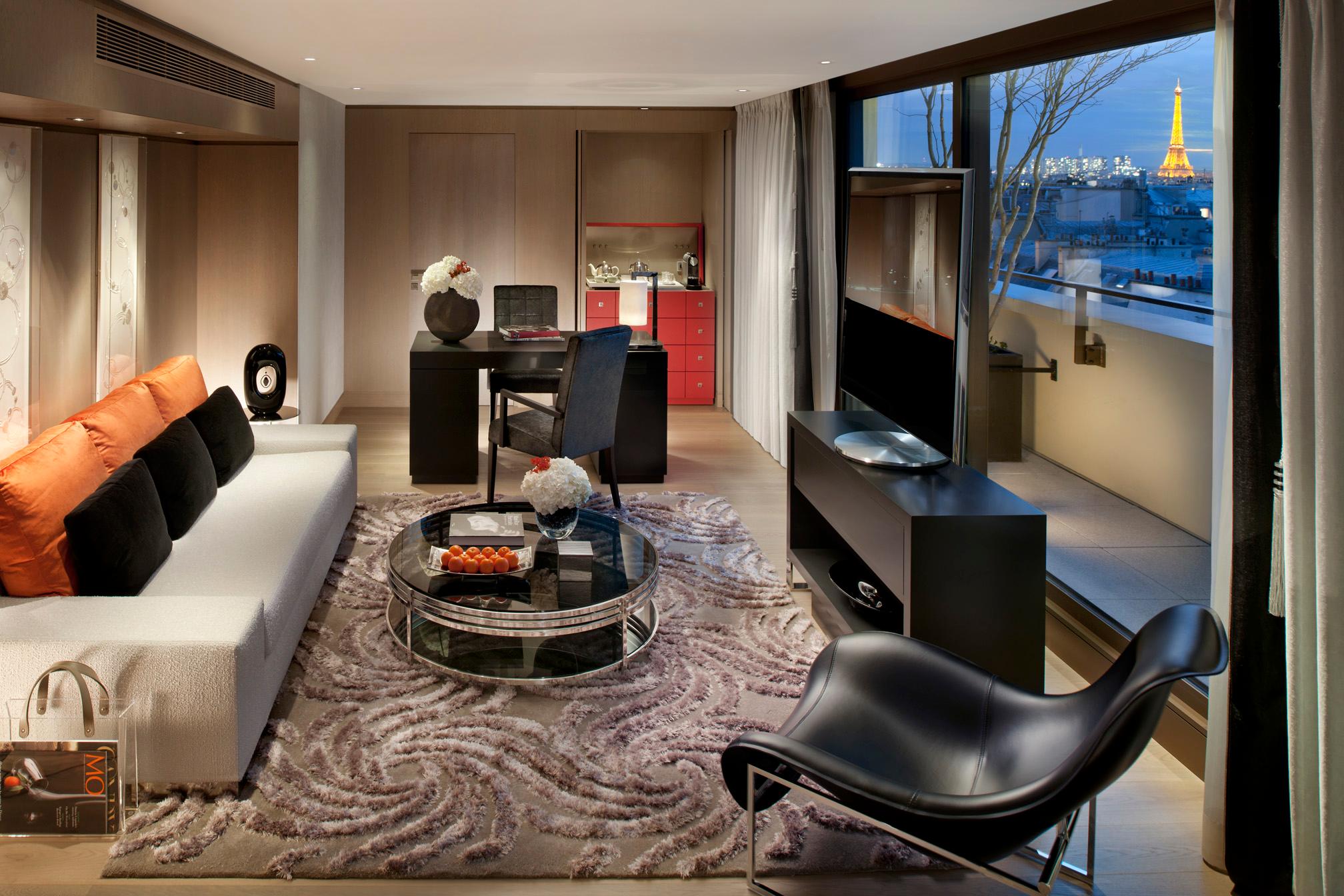[vc_row njt-role=”people-in-the-roles” njt-role-user-roles=”administrator,armember”][vc_column][vc_column_text]
In recent years, upscale hotels had to adapt to the demands of an increasingly connected clientele and have therefore implemented numerous projects aimed at improving their services through digital technology. However, the coronavirus crisis accelerated the need for digitalisation in the high-end hotel industry, but this time with a major new challenge: to reassure guests after their traumatic coronavirus experience. In the post-coronavirus era, we are therefore witnessing a renewal of the prestige hotel landscape with a hotel sector that must more than ever face the challenges of the digital revolution and increase its credibility.
The main challenge in renewing the codes of the luxury hotel industry is to seduce and capture a new generation of customers: customers that the coronavirus crisis has made more connected, eager for technological progress and innovation but also more worried and recalcitrant to the idea of travelling again.
Digitalization: a godsend to face the future world
The global health emergency has led to an accelerated digitisation of services in luxury hotels.
While it was already possible to book online, high-end hotels now offer check-in and check-out without any human contact to adapt to the “next world” in which social distancing will be the norm.
This is the case of the American luxury group Hilton, which will redouble its efforts to extend its “Digital Key” technology to all common doors and access points. Guests will be able to check in, enter and leave their room with a virtual key, thanks to a simple Bluetooth connection on their mobile phone.
More than a room key, the smartphone will be able to serve as a remote control for the TV and will also be useful for adjusting the light or even the heating.
It will even be a tool for accessing the hotel’s room service restaurant services. High-end hotels are currently redeploying their mobile applications to allow guests to view a detailed menu of dishes directly from their phones, with the possibility to enter special requests, details of how the meat is cooked and the desired time of service.
A totally dematerialized route and a completely digitalized offer that tends to make reception and certain staff members disappear, but which above all allows the high-end hotel industry to update itself in preparation for the new measures of social distancing that will prevail in the post-coronavirus era.
The digital transformation of prestigious hotels is therefore not an end in itself, but a way for them to adapt to the coming society, to be in line with new emerging standards and to meet the increased safety and hygiene needs of the future clientele.
Ultra-customization: the importance of a good “customer experience”
The dematerialization of services in luxury hotels should not be synonymous with dehumanizing the customer relationship.
On the contrary, containment has amplified users’ needs for digital support, and the high-end hotel industry has understood this.
If, already in normal times, customers needed to be reassured about the course of their stay (how to get to the hotel, the time of check-in, whether they can come separately, whether there is a car park, etc.), this need for information and reassurance has been multiplied in the current context of instability.
Luxury hotels have therefore decided to strengthen their digital communication, particularly their chat technology, to become instantly available to travellers and reassure them about their hygiene measures and the precautions to be taken when business resumes.
Beyond the robotic chats, they are going to set up real conversations between the traveller and the hotel via live chat (Chat with a human), a contact that has become almost essential as travelers are looking for authenticity.
Hotels will thus be able to respond to guests’ requests in real time, 24 hours a day, and offer a range of services tailored to their profile, with the aim of assisting them in their quest for a future trip and making the booking process more fluid and personalized.
The digitalization of the payment experience is also a major challenge for the luxury hotel industry to avoid shopping cart dropouts and convert hesitant travelers to stay at their hotels. Offering digital payment methods (digital footprint, PayPal, etc.) would optimise the entire purchasing process and secure the future of the luxury hotel industry.
This is why the prestigious Mandarin Oriental hotel group recently enriched its digital experience for travelers in China by unveiling an all-inclusive booking and payment experience on the WeChat platform. Guests will now be able to book at any Mandarin Oriental property worldwide from the platform with just a few clicks and use their in-App WeChat Pay account to secure their reservations.
“We are delighted to be the first luxury hotel group to offer this combined booking and payment functionality on China’s preferred social media and e-commerce platform, which enhances our digital service delivery to guests”. said Jill Kluge, Chief Marketing Officer for Mandarin Oriental Hotel Group.
Better connectivity and digital performance ultimately enables hotels to better respond to the challenges imposed by the coronavirus crisis.
More technology and investment in customer relations will reassure future guests about the hotel’s standards of comfort, health and safety, as well as about its ability to innovate, modernise and adapt to new realities.
The digital transformation therefore appears today more as a strategy for the luxury hotel industry to recover from the crisis and convince a careful and vigilant clientele.
Read also > Post-Covid-19 : luxury hotels are practicing news sanitary standards
Featured photo : Mandarin Oriental
[/vc_column_text][/vc_column][/vc_row][vc_row njt-role=”not-logged-in”][vc_column][vc_column_text]
In recent years, upscale hotels had to adapt to the demands of an increasingly connected clientele and have therefore implemented numerous projects aimed at improving their services through digital technology. However, the coronavirus crisis accelerated the need for digitalisation in the high-end hotel industry, but this time with a major new challenge: to reassure guests after their traumatic coronavirus experience. In the post-coronavirus era, we are therefore witnessing a renewal of the prestige hotel landscape with a hotel sector that must more than ever face the challenges of the digital revolution and increase its credibility.
The main challenge in renewing the codes of the luxury hotel industry is to seduce and capture a new generation of customers: customers that the coronavirus crisis has made more connected, eager for technological progress and innovation but also more worried and recalcitrant to the idea of travelling again.
Digitalization: a godsend to face the future world
[…][/vc_column_text][vc_cta h2=”This article is for subscribers only.” h2_font_container=”font_size:16″ h2_use_theme_fonts=”yes” h4=”Subscribe now!” h4_font_container=”font_size:32|line_height:bas” h4_use_theme_fonts=”yes” txt_align=”center” color=”black” add_button=”right” btn_title=”I SUBSCRIBE!” btn_color=”danger” btn_size=”lg” btn_align=”center” use_custom_fonts_h2=”true” use_custom_fonts_h4=”true” btn_button_block=”true” btn_custom_onclick=”true” btn_link=”url:https%3A%2F%2Ftest2023.luxus-plus.com%2Fen%2Fabonnements-et-newsletter-2%2F|||”]Unlimited access to all the articles and live a new reading experience, preview contents, exclusive newsletters…
Already have an account? Log in.
[/vc_cta][vc_column_text]Featured photo : © Mandarin Oriental[/vc_column_text][/vc_column][/vc_row][vc_row njt-role=”people-in-the-roles” njt-role-user-roles=”customer”][vc_column][vc_column_text]
In recent years, upscale hotels had to adapt to the demands of an increasingly connected clientele and have therefore implemented numerous projects aimed at improving their services through digital technology. However, the coronavirus crisis accelerated the need for digitalisation in the high-end hotel industry, but this time with a major new challenge: to reassure guests after their traumatic coronavirus experience. In the post-coronavirus era, we are therefore witnessing a renewal of the prestige hotel landscape with a hotel sector that must more than ever face the challenges of the digital revolution and increase its credibility.
The main challenge in renewing the codes of the luxury hotel industry is to seduce and capture a new generation of customers: customers that the coronavirus crisis has made more connected, eager for technological progress and innovation but also more worried and recalcitrant to the idea of travelling again.
Digitalization: a godsend to face the future world
[…][/vc_column_text][vc_cta h2=”This article is for subscribers only.” h2_font_container=”font_size:16″ h2_use_theme_fonts=”yes” h4=”Subscribe now!” h4_font_container=”font_size:32|line_height:bas” h4_use_theme_fonts=”yes” txt_align=”center” color=”black” add_button=”right” btn_title=”I SUBSCRIBE!” btn_color=”danger” btn_size=”lg” btn_align=”center” use_custom_fonts_h2=”true” use_custom_fonts_h4=”true” btn_button_block=”true” btn_custom_onclick=”true” btn_link=”url:https%3A%2F%2Ftest2023.luxus-plus.com%2Fen%2Fabonnements-et-newsletter-2%2F|||”]Unlimited access to all the articles and live a new reading experience, preview contents, exclusive newsletters…
Already have an account? Log in.
[/vc_cta][vc_column_text]Featured photo : © Mandarin Oriental[/vc_column_text][/vc_column][/vc_row]








